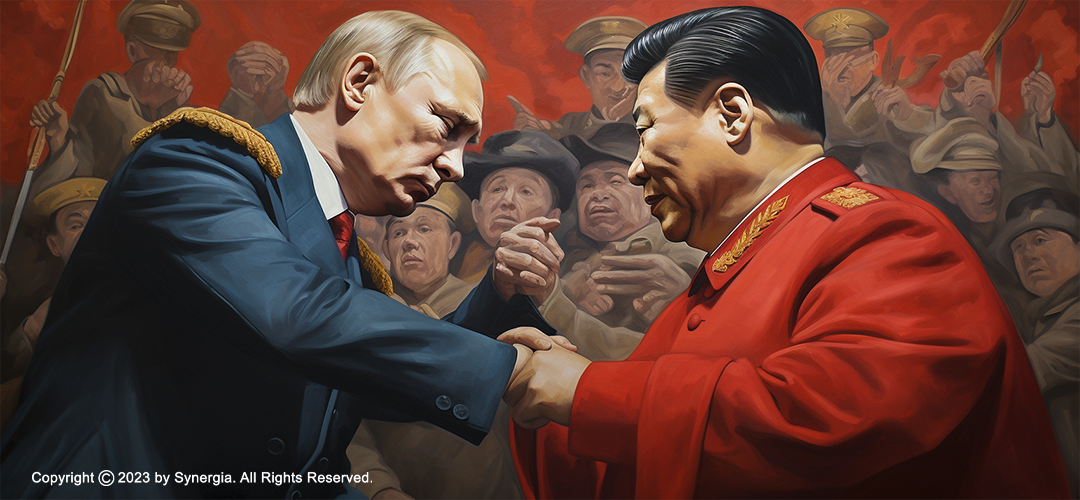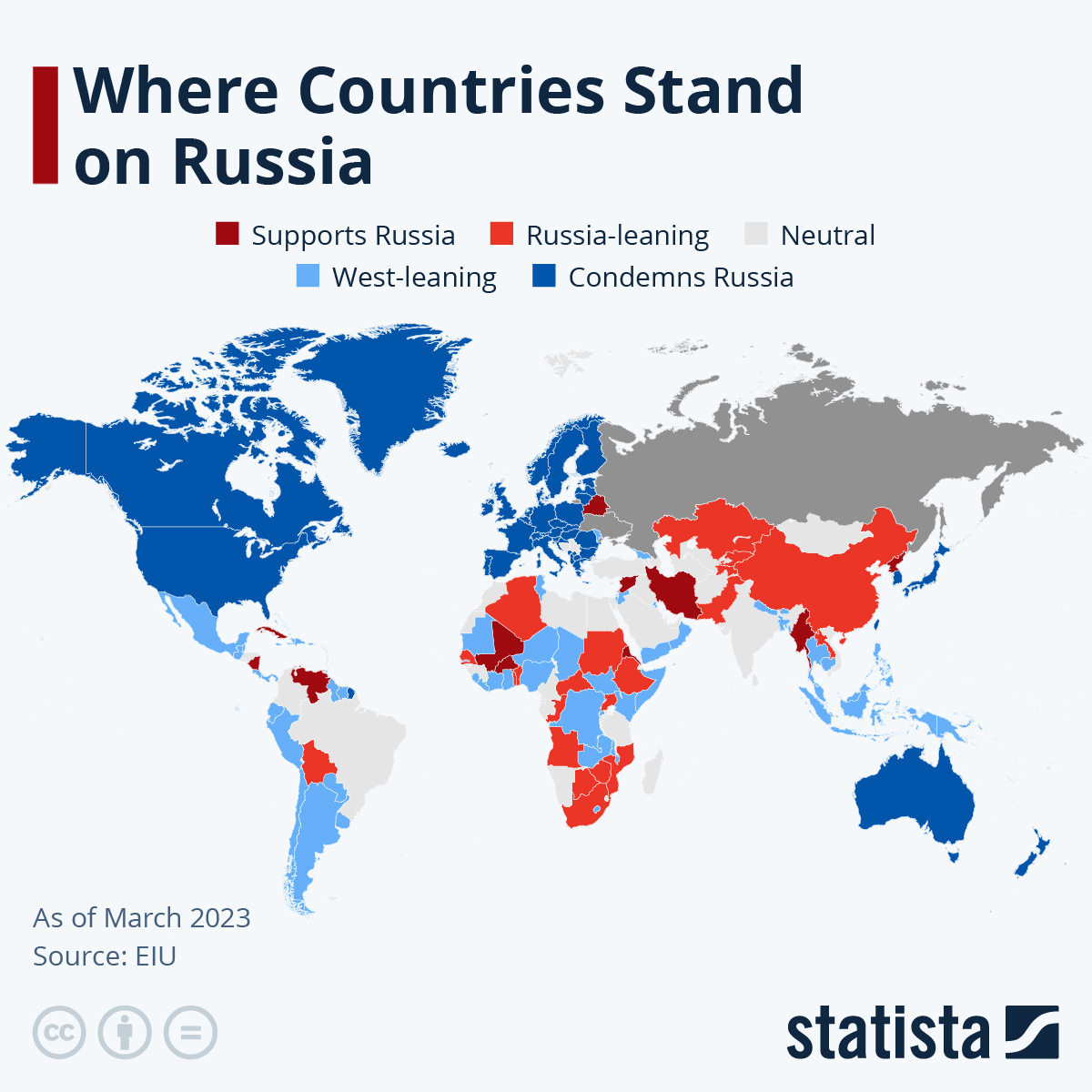China-Russia and the West: A Global South Perspective
July 1, 2023 | Expert Insights

While Western countries have condemned Russia's invasion of Ukraine and imposed sanctions on it, many Global South nations have refused to take sides in the Russia-Ukraine war. Several Latin America, Africa, and Asia countries continue to abstain from condemning Russia and implementing Western sanctions.
More than a year since the Ukraine war started, the Western world has failed to garner universal support against Russia. The war has given rise to a new avatar of the long dead non alignment for nations who cannot afford to take sides in an increasingly polarised world.
Background
Prominent among those nations who have tried to avoid Western pressures for condemning Russia and participating in the sanction regime are China, India, Brazil, Bangladesh, Pakistan, and Indonesia. In addition, a large number of emerging economies in Africa, Asia, and Latin America have similarly refused to condemn Russia at the UN and, in many cases, have continued to trade with Moscow despite threats of secondary sanctions. Bolivia, Cuba, El Salvador, and Venezuela have permitted Russia to avoid Western sanctions. Argentina and Mexico have made it clear that they do not want to participate in sanctions since they are interested in maintaining good relations.
This does not mean they support the Russian invasion of a sovereign country. Most Latin American countries supported the UN resolution calling for Russia's withdrawal from captured territory, even if they refused to explicitly condemn Russia.
A similar approach is visible in Asia. While Japan and South Korea have condemned Russia, the Association of Southeast Asian Nations has not done so. China maintains a strategic relationship with Russia. Indonesia’s foreign ministry asserted that it would not blindly follow the steps taken by another country.
This global sentiment is reminiscent of the non-alignment era when many newly independent nations tried to avoid getting involved in the cold war. The NAM held its first convention in 1955 in Bandung, Indonesia, where leaders like Jawaharlal Nehru, Josip Tito of Yugoslavia, and Abdel Nasser of Egypt met to affirm their commitment to non-alignment. The movement was a response to the polarisation of the global order between the two major world powers- the Soviet Union and the U.S. Both sides sought allies/ vassal states to form their respective military alliances – NATO and the Warsaw Pact. As countries took sides and formed opposing blocs, many developing countries decided they did not want to join either. These formerly colonised countries were determined to free themselves of foreign control and exercise autonomy in their foreign policy. They were also interested in maintaining harmonious relations with both sides since they required the assistance of both powers for their national development.

Analysis
A similar global polarisation is present today - not just because of Ukraine but also between the rising contestations between the U.S. and China, as the two powers compete for global influence.
However, one key difference is that developing countries are much stronger than before, with many rising powers amongst them. The gross domestic product in terms of purchasing power of the BRICS nations now exceeds that of the G7 group, which comprises developed countries. This increasing economic power allows them to play a more active role internationally. For instance, Brazil has made concerted efforts to mediate the Ukraine conflict and can play a diplomatic role because it refuses to join sides. Further, the rise of China as a major power has reduced the pressure to side with the West. China has spent billions of dollars on developing infrastructure in the Global South.
While the non-aligned stance is motivated by the need to maintain diplomatic relations and preserve foreign policy autonomy, political and economic factors also contribute to nations' refusal to take sides. For many developing countries, Russia is a key supplier of arms, energy (particularly oil and gas), fertiliser, and other important goods.
India has remained prominently non-aligned in its stance on Ukraine, refusing to condemn the invasion and significantly increasing imports of Russian oil. Russia and India share a strategic alliance that dates to the Cold War, and Russia is also a key arms supplier for India. With its developing economy, India cannot afford to not take advantage of the discounted Russian oil prices that the war has led to.
Assessment
- While Russia's invasion of Ukraine clearly violates territorial borders and state sovereignty, many developing countries prefer not to take sides in the conflict. While the West still holds out the greater promise of economic aid and trade, its charm has significantly faded from a perception that the U.S., in particular, and its European allies, in general, are declining powers. However, at the same time, China is still not fully transformed as a true successor to the U.S. to make the fence sitters change their stance. Hence, the confusion and prevalent opportunism.
- These sentiments underscore the vast chasm in perception between the West and the Global South whether Ukraine is a threat to the rules-based global order. Many countries believe that the West has a role in provoking Russia into this quagmire, and while the Russians and the Ukrainians have paid dearly for it, the West has been the benefactor by wrecking Russia as a significant military power. Political and economic factors also influence these nations’ refusal to condemn Russia.
- This new non-alignment movement also reflects a widespread dissatisfaction in the Global South with the Western liberal international order, which does not adequately reflect their interests and needs. At the same time, it opens an opportunity for emerging economies like India and Brazil to give voice to the interests of the Global South. In its global role, it could be a turning moment, especially for India. But is the country prepared to take the plunge or equipped to handles these awesome responsibilities?








Comments